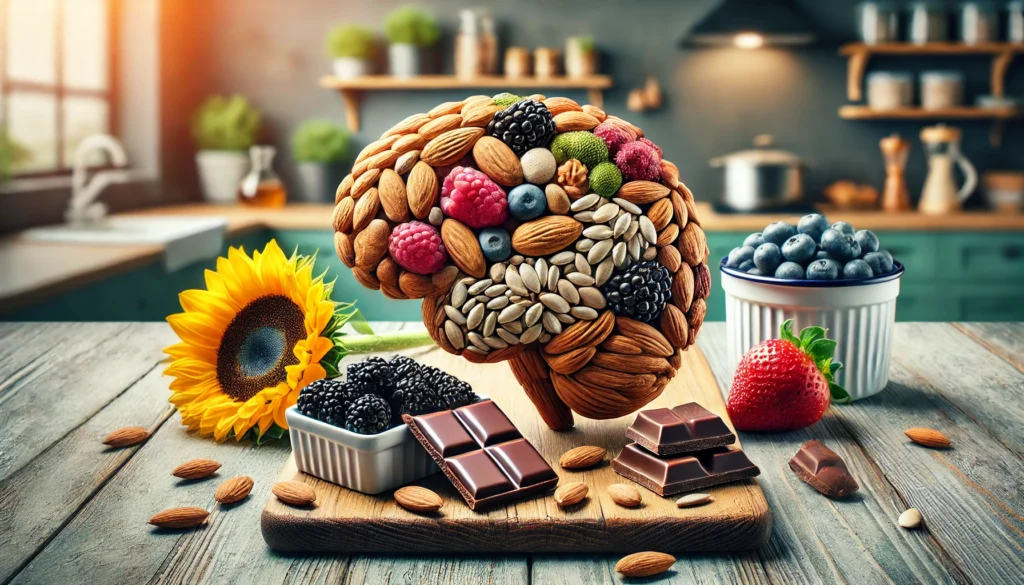Introduction: The Power of Nutrition for Brain Health
The human brain is a complex organ that requires adequate nourishment to function optimally. The foods we consume significantly impact cognitive function, memory retention, and overall mental acuity. Research increasingly points to the link between diet and brain performance, showing that nutrient-dense foods enhance cognitive ability while poor dietary choices contribute to cognitive decline. This article explores the best brain foods, how they contribute to cognitive enhancement, and strategies for maintaining brain health through dietary choices.
You may also like: Stay Mentally Sharp in Your 70s: How to Turn Your Aging Brain Around with Science-Backed Strategies
How Nutrition Affects Brain Function
Every cell in the body, including those in the brain, requires essential nutrients to perform efficiently. The brain, which consumes about 20% of the body’s energy, depends on a steady supply of glucose, healthy fats, amino acids, vitamins, and minerals to sustain mental clarity and focus. Deficiencies in key nutrients can lead to cognitive impairment, reduced alertness, and an increased risk of neurodegenerative diseases. Understanding how nutrition affects brain function allows individuals to make informed dietary choices that support long-term cognitive health.

The Best Brain Foods for Cognitive Enhancement
Fatty Fish: Omega-3 Powerhouses
Fatty fish, such as salmon, mackerel, sardines, and trout, are among the best foods for brain health. They are rich in omega-3 fatty acids, essential for maintaining cell membrane integrity and supporting neurotransmitter function. Omega-3s help reduce inflammation, enhance synaptic plasticity, and improve memory retention. Studies show that regular consumption of fatty fish is associated with a lower risk of Alzheimer’s disease and age-related cognitive decline.
Leafy Green Vegetables: A Brain-Boosting Superfood
Leafy greens, including spinach, kale, and Swiss chard, are excellent foods to boost memory and protect cognitive function. Rich in folate, vitamin K, and antioxidants, these vegetables help slow cognitive decline and support neural communication. Folate, in particular, plays a crucial role in DNA synthesis and neurotransmitter production, making it an essential nutrient for brain nourishment.
Berries: Antioxidant Powerhouses
Berries, such as blueberries, strawberries, and blackberries, are packed with flavonoids, antioxidants that combat oxidative stress in the brain. These compounds improve neuronal signaling, enhance memory, and reduce the risk of neurodegenerative diseases. Regular consumption of berries has been shown to improve cognitive performance and support long-term brain health.
Nuts and Seeds: Brain-Boosting Snacks
Nuts and seeds are excellent sources of vitamin E, an antioxidant that protects brain cells from oxidative damage. Almonds, walnuts, flaxseeds, and chia seeds provide essential fatty acids, protein, and micronutrients that support cognitive function. Walnuts, in particular, contain high levels of DHA, a type of omega-3 fatty acid that has been linked to improved cognitive performance and neuroprotection.
Whole Grains: Sustained Energy for Mental Clarity
Whole grains, such as oats, quinoa, and brown rice, provide a steady supply of glucose to the brain. Complex carbohydrates found in whole grains help maintain stable blood sugar levels, preventing energy crashes that can impair focus and alertness. The fiber content in whole grains also supports gut health, which has been linked to improved cognitive function through the gut-brain axis.
Dark Chocolate: A Delicious Cognitive Enhancer
Dark chocolate, particularly varieties containing at least 70% cocoa, is rich in flavonoids, caffeine, and antioxidants. These compounds enhance cognitive function, improve mood, and increase blood flow to the brain. Regular consumption of moderate amounts of dark chocolate has been shown to boost memory and support overall mental well-being.
The Role of Hydration in Cognitive Performance
Water is essential for maintaining brain function. Dehydration can lead to brain fog, fatigue, and decreased cognitive performance. Drinking sufficient water throughout the day ensures that nutrients are efficiently transported to brain cells and that waste products are effectively removed. Herbal teas and other hydrating beverages can also support cognitive health.
Best Cereals for Memory and Cognitive Function
Choosing the right cereals can significantly impact cognitive health. Whole grain cereals fortified with essential vitamins and minerals, such as iron and B vitamins, help sustain energy levels and support neurotransmitter function. Oats, bran flakes, and quinoa-based cereals are excellent choices for maintaining brain function.
What Drinks Help with Memory Loss?
Hydration plays a crucial role in brain function, and certain beverages provide additional cognitive benefits. Green tea, rich in L-theanine and catechins, enhances alertness and promotes neuroprotection. Coffee, in moderation, improves focus and reaction time due to its caffeine content. Additionally, smoothies made with brain-boosting ingredients like berries, nuts, and dark chocolate can provide essential nutrients for cognitive enhancement.
How to Keep Your Brain Healthy Through Lifestyle and Diet
A combination of dietary and lifestyle factors determines long-term brain health. Engaging in regular physical activity, maintaining a balanced diet, managing stress, and getting adequate sleep are essential for preserving cognitive function. Mindful eating habits, such as incorporating a variety of nutrient-dense foods, help support brain nourishment and overall well-being.

Frequently Asked Questions
1. What are the best brain foods for improving memory and cognitive function?
Brain foods play a crucial role in maintaining cognitive function and overall brain health. Some of the best brain foods include fatty fish like salmon, walnuts, and blueberries, which provide essential omega-3 fatty acids and antioxidants. Leafy greens such as spinach and kale contain high levels of vitamin K, which supports brain function. Whole grains like oats and brown rice help regulate blood sugar levels, ensuring a steady supply of energy to the brain. Incorporating these foods to boost memory into your diet consistently can contribute to long-term cognitive health.
2. How can diet impact mental alertness and focus throughout the day?
Diet plays a significant role in how alert and focused you feel during the day. Consuming foods that improve memory, such as eggs and dark chocolate, can enhance cognitive function by providing essential nutrients like choline and flavonoids. Whole grains and lean proteins help maintain stable blood sugar levels, preventing energy crashes that lead to sluggishness. Hydration is also key—drinking water and herbal teas instead of sugary beverages helps sustain mental clarity. Choosing brain-boosting foods in your meals can improve concentration and productivity.
3. What are some foods that help with memory retention and recall?
Certain foods are particularly effective in supporting memory retention and recall. Avocados, for example, provide healthy fats that improve blood flow to the brain. Nuts, especially almonds and walnuts, contain vitamin E, which has been linked to cognitive longevity. Dark chocolate has flavonoids that can enhance memory and reduce oxidative stress. Including best brain foods like these in your diet regularly can contribute to better memory retention and sharper recall abilities.
4. Are there specific brain food snacks that can enhance cognitive function?
Yes, several brain food snacks can help keep your mind sharp throughout the day. A handful of mixed nuts and seeds, such as almonds, sunflower seeds, and flaxseeds, provide essential nutrients like omega-3s and vitamin E. Greek yogurt with berries is another great option, offering probiotics for gut health and antioxidants for brain function. Hard-boiled eggs are rich in choline, which supports memory and learning. Including brain-boosting foods in your snacks can improve cognitive function without the need for processed or sugary alternatives.
5. How do whole grains contribute to brain health?
Whole grains like quinoa, brown rice, and oats provide a steady source of glucose, which is essential for brain function. Unlike refined carbohydrates, which cause blood sugar spikes and crashes, whole grains help maintain consistent energy levels. They also contain B vitamins that support neurotransmitter function and cognitive performance. Whole grains are one of the best foods for brain health, as they help sustain mental alertness throughout the day. Incorporating these into meals ensures long-term benefits for cognitive well-being.
6. What drinks help with memory loss and cognitive decline?
Certain drinks have been shown to support brain health and potentially slow cognitive decline. Green tea contains catechins that help improve brain function and memory. Coffee, when consumed in moderation, provides caffeine and antioxidants that can boost alertness and mental performance. Blueberry smoothies are rich in antioxidants that combat oxidative stress in the brain. Staying hydrated with these brain-nourishing beverages can enhance mental clarity and reduce the risk of memory issues.
7. What cereals are considered the best for memory and cognitive function?
The best cereals for memory contain whole grains, fiber, and brain-supporting nutrients. Oatmeal is an excellent choice because it provides slow-releasing energy and B vitamins. Fortified cereals that contain folic acid and iron can also help with cognitive function. Muesli with nuts and dried fruits provides a combination of healthy fats, antioxidants, and fiber, all of which support brain health. Choosing best brain foods in the form of whole-grain cereals can be a smart way to start your day with sustained mental energy.
8. How can you keep your brain healthy as you age?
Maintaining a healthy brain requires a combination of proper nutrition, physical activity, and mental exercises. Consuming foods that help with memory, such as leafy greens, fatty fish, and nuts, supports cognitive function. Regular physical exercise increases blood flow to the brain, promoting neurogenesis. Engaging in mental challenges like puzzles and learning new skills can help prevent cognitive decline. Developing healthy brain habits ensures long-term mental agility and clarity.
9. What are 10 ways to keep your brain healthy?
There are several effective ways to maintain brain health throughout life. First, eating a balanced diet rich in brain-boosting foods supports cognitive function. Second, regular exercise enhances circulation and mental sharpness. Third, maintaining social connections helps reduce the risk of memory decline. Fourth, adequate sleep is essential for memory consolidation and brain detoxification. Fifth, managing stress through meditation and relaxation techniques prevents cognitive overload. Sixth, staying mentally active with reading and problem-solving exercises helps stimulate brain activity. Seventh, limiting alcohol and processed foods protects neural pathways. Eighth, staying hydrated supports cognitive function. Ninth, maintaining a positive mindset contributes to mental resilience. Finally, engaging in lifelong learning can enhance neuroplasticity and overall brain health.
10. How can you boost brain power naturally?
Boosting brain power naturally involves making strategic lifestyle choices that support cognitive function. Eating brain improvement foods such as avocados, nuts, and whole grains helps nourish the brain. Regular physical exercise promotes oxygen flow to the brain, supporting neurogenesis. Engaging in mindfulness practices like meditation can reduce stress and improve focus. Learning new skills, such as playing a musical instrument or speaking a new language, strengthens neural connections. Combining these strategies can significantly enhance mental performance and longevity.

Conclusion: Optimizing Brain Function Through Nutrition
Dietary choices have a profound impact on cognitive health, memory, and mental clarity. Incorporating the best brain foods, staying hydrated, and making lifestyle adjustments contribute to long-term brain function and reduce the risk of neurodegenerative diseases. By prioritizing nutrient-dense foods and adopting healthy habits, individuals can enhance memory, boost alertness, and maintain optimal cognitive performance throughout life.
brain-boosting nutrition, cognitive function foods, memory-enhancing diet, best foods for focus, healthy brain diet, natural brain enhancers, superfoods for brain health, nutrition for mental clarity, diet for sharp memory, foods that aid concentration, top brain-healthy foods, nutrient-rich foods for the brain, best diet for cognitive health, brain-supporting nutrients, powerful foods for brain function, omega-3 for brain health, vitamins for memory retention, diet for mental performance, best snacks for brainpower, brain-friendly meal planning
Further Reading:
Best Foods for A Healthy Brain and Improved Memory
12 foods to boost brain function
Best Nutrients for Brain Health
Disclaimer
The information contained in this article is provided for general informational purposes only and is not intended to serve as medical, legal, or professional advice. While Health11News strives to present accurate, up-to-date, and reliable content, no warranty or guarantee, expressed or implied, is made regarding the completeness, accuracy, or adequacy of the information provided. Readers are strongly advised to seek the guidance of a qualified healthcare provider or other relevant professionals before acting on any information contained in this article. Health11News, its authors, editors, and contributors expressly disclaim any liability for any damages, losses, or consequences arising directly or indirectly from the use, interpretation, or reliance on any information presented herein. The views and opinions expressed in this article are those of the author(s) and do not necessarily reflect the official policies or positions of Health11News.


